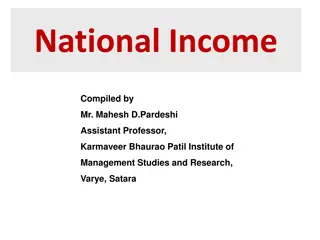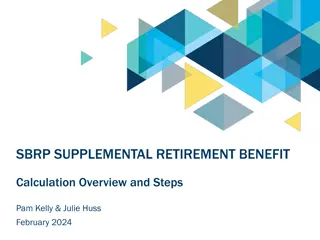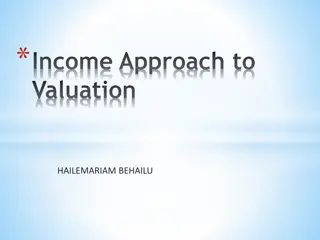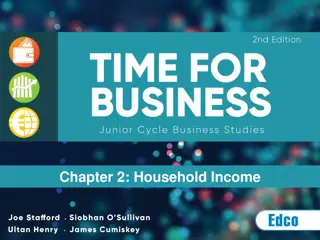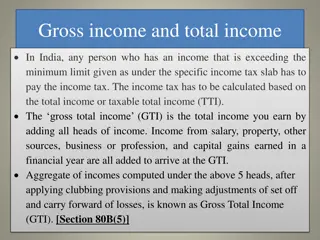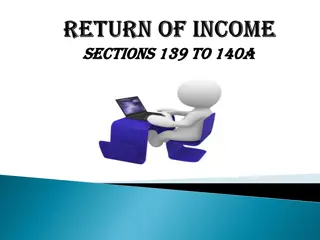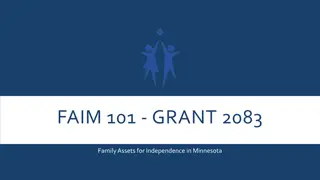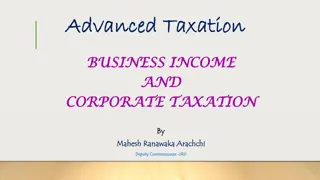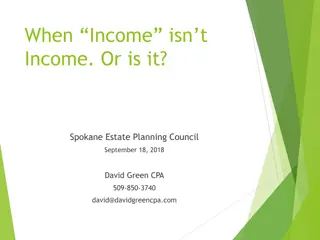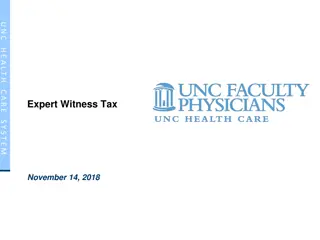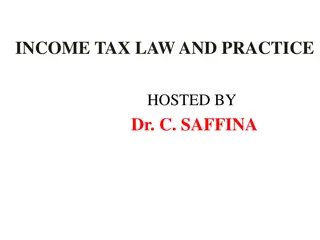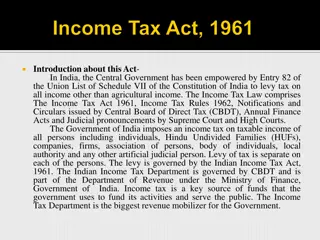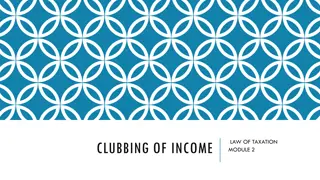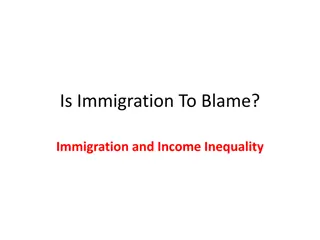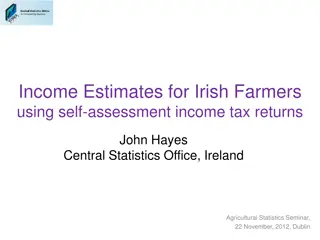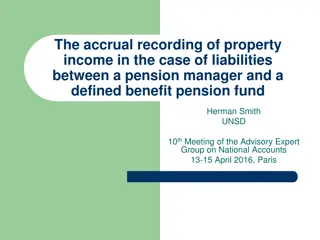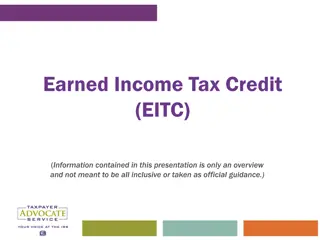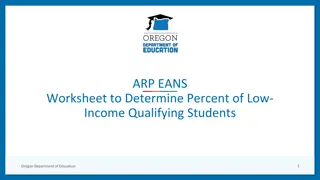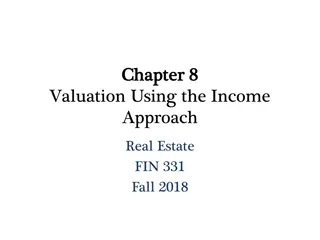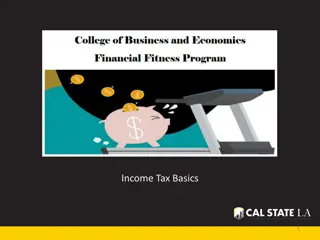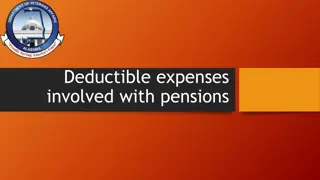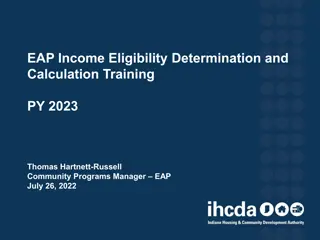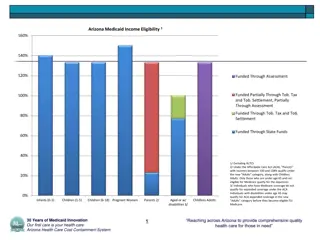Understanding Concepts of National Income in Economics
Explore the concepts of national income presented by Dr. Rashmi Pandey, covering key indicators such as Gross National Product (GNP), Gross Domestic Product (GDP), Net National Product (NNP), Net Domestic Product (NDP), Personal Income, Disposable Income, Per Capita Income, and Real Income. Gain ins
0 views • 22 slides
Understanding National Income and Its Importance in Economics
National income is a crucial measure of the value of goods and services produced in an economy. It provides insights into economic growth, living standards, income distribution, and more. Concepts such as GDP, GNP, Personal Income, and Per Capita Income help in understanding the economic health of a
5 views • 14 slides
SBRP SUPPLEMENTAL RETIREMENT BENEFIT
Supplementation retirement benefit (SBRP) is a defined benefit providing lifetime income separately managed by SBCTC. Eligibility requirements include age, years of service, and disability retirement provisions. Calculations are complex and based on retirement age, years of service, goal income, and
0 views • 26 slides
Understanding the Income Approach to Property Valuation
The income approach to property valuation involves analyzing a property's capacity to generate future income as an indication of its present value. By considering income streams from rent and potential resale, commercial property owners can convert income forecasts into value estimates through proce
8 views • 49 slides
Understanding Veteran Eligibility and Enrollment in VHA System
Participants will learn about criteria for Veteran eligibility for healthcare services in the VHA system, enrollment steps, priority groups, and characteristics of service. Veterans can apply for benefits electronically via eBenefits or in person. Veteran healthcare services are provided as a benefi
0 views • 37 slides
Understanding Household Income: Sources, Types, and Management
Explore Chapter 2 on household income to learn about sources like wages, pensions, and benefits, differentiate between regular and irregular income, understand why taxes are necessary, interpret payslips, calculate gross and net income, manage deductions, and create an effective income plan.
0 views • 25 slides
Understanding the Earned Income Tax Credit
Explore the Earned Income Tax Credit (EITC) as a vital tool in poverty reduction, providing cash to low-income individuals, encouraging work and self-reliance. Learn about eligibility criteria, income thresholds, and the role of social work in promoting EITC benefits.
0 views • 28 slides
Understanding Income Tax in India: Gross vs Total Income
In India, income tax is calculated based on the total income or taxable total income. The gross total income includes earnings from all sources like salary, property, business, and capital gains. Various additions such as clubbing provisions, adjustments for losses, unexplained credits, investments,
0 views • 7 slides
Understanding the Importance of Filing Income Tax Returns
Filing income tax returns is crucial as it involves declaring total income and tax payable. Deadlines are specified based on the type of assessee, with penalties for late filing. The process allows for claiming refunds, showing financial worth for visas, and ensuring eligibility for tenders. Failing
0 views • 26 slides
Virginia Perspective 2020 State Supervised Eligibility Dashboard
The implementation of Virginia Perspective 2020, a state-supervised and locally-administered program, involves notifying staff through agency broadcasts and email alerts to detect fraud. Eligibility workers receive alerts through VaCMS Dashboard for PARIS matches, ensuring timely actions on case eli
0 views • 10 slides
Understanding Tax Obligations and Assessable Income in Australia
In Australia, residents are taxed on worldwide income while non-residents are taxed only on Australian-sourced income. The tax liability is calculated based on taxable income, tax offsets, other liabilities like Medicare levy, and PAYG credits. Assessable income includes employment income, super pen
0 views • 13 slides
Developmental Disability Eligibility Reform Amendment Act of 2022 Overview
The Developmental Disability Eligibility Reform Amendment Act of 2022 introduces new definitions, eligibility criteria, and expands services for individuals with developmental disabilities. It defines intellectual disability, developmental disability, and introduces substantial functional limitation
3 views • 13 slides
Family Assets for Independence in Minnesota (FAIM) Program Overview
The Family Assets for Independence in Minnesota (FAIM) program helps individuals achieve financial independence through a structured process involving eligibility criteria, opening a savings account, financial coaching, obtaining assets, and closing the account. Eligibility requirements include inco
0 views • 25 slides
Understanding Sri Lanka's Inland Revenue Act No. 24 of 2017
This content delves into the key aspects of the Inland Revenue Act No. 24 of 2017 in Sri Lanka, covering chargeability of income tax, imposition of income tax, definitions, sources of income, assessable income for residents and non-residents, income tax payable, and income tax base. It provides valu
0 views • 93 slides
Understanding National Income Measurement in India
National income in India is the culmination of all economic activities valued in money terms. It plays a crucial role in determining the economic environment of a country and the demand for goods and services. Various measures of national income such as Gross National Product (GNP), Gross Domestic P
0 views • 20 slides
Understanding Trust Income Allocation in Estate Planning
Dive into the complexities of trust income allocation, distinguishing between principal and income in trusts and exploring examples of how various types of income are treated for trust accounting purposes. Learn about the rules governing income distributions and the implications for beneficiaries.
0 views • 26 slides
Taxation Process for Expert Witness Income at U.N.C.H.E.A.L.T.H.C.A.R.E.S.Y.S.T.E.M
Expert witness income at U.N.C.H.E.A.L.T.H.C.A.R.E.S.Y.S.T.E.M is subject to unrelated business income tax (UBIT) if the income is related to a provider testifying as an expert. The process involves calculating taxable income, determining tax rates, and reporting to the University's finance departme
0 views • 5 slides
Understanding Income from House Property in Taxation
House property income refers to rent received from properties owned by an individual, charged under income tax. It is based on the concept of annual value, representing the expected rental income or market value of the property. The annual value is taxable under the head "Income from House Property.
1 views • 12 slides
Understanding Income Tax Law and Practice with Dr. C. Saffina
Dive into the realm of Income Tax Law and Practice hosted by Dr. C. Saffina, Assistant Professor of Commerce, as the concept of income from other sources is explained. Explore what is taxable income, such as dividends, interest on securities, and winnings from gambling, and learn how to compute inco
0 views • 14 slides
Overview of Income Tax Authorities in India
The Income Tax Act in India empowers the Central Government to levy taxes on all income except agricultural income. The Income Tax Department, governed by the Central Board of Direct Taxes, plays a crucial role in revenue mobilization. Understanding the functioning, powers, and limitations of tax au
0 views • 14 slides
Understanding Residuary Income and Taxable Sources
Residuary income, under section 56(1), includes all income not excluded from total income and subjected to income tax under "Income from other sources." Certain specific incomes listed in section 56(2) are taxable, such as dividends, winnings, employee contributions, interest on securities, and inco
0 views • 9 slides
Understanding Clubbing of Income in Taxation
Clubbing of income refers to including another person's income in the taxpayer's total income to prevent tax avoidance practices like transferring assets to family members. This concept is addressed in sections 60 to 64 of the Income Tax Act. Key terms include transferor, transferee, revocable trans
1 views • 16 slides
College Credit Plus: Student Eligibility Guidelines
The Ohio Revised Code has modified the eligibility process for College Credit Plus, effective from the academic year 2018-2019. There are three key steps for participation: Eligibility Determination, College/University Admission, and Course Placement. Eligibility is determined based on assessment te
0 views • 47 slides
Evolution of Progressive Income Tax Systems
The concept of modern progressive income tax, developed in the early 20th century in countries like the UK, US, France, India, and Argentina, is based on the principle of a comprehensive tax base encompassing various income categories. The system involves effective vs. marginal tax rates, different
0 views • 19 slides
Understanding Retiree Insurance Eligibility and Funding
Retiree insurance eligibility is a crucial aspect that retirees should understand before retiring. The process involves determining eligibility for retiree group insurance, which is separate from retirement eligibility. By meeting certain requirements such as having served consecutively in a full-ti
0 views • 12 slides
Exploring Immigration's Impact on Income Inequality
The presentation delves into the relationship between immigration and income inequality, analyzing data on income distributions among voters, non-voting citizens, and non-citizens in PA. It discusses the log-normal distribution as an approximation for income distribution and examines the ratio of me
0 views • 16 slides
Understanding NCAA Initial Eligibility Requirements
The NCAA Eligibility Center plays a crucial role in determining the eligibility of college-bound student-athletes in Divisions I and II based on academic and amateurism certifications. Academic eligibility requirements differ among the three divisions, emphasizing graduation from high school, comple
0 views • 24 slides
Analysis of Irish Farmer Incomes Based on Income Tax Returns
This paper presents an analysis of Irish farmer incomes in 2010 using self-assessment income tax returns from the Revenue Commissioners. The study focused on various income sources such as trading income, rental income, employment income, social welfare transfers, and pension income. The dataset com
0 views • 12 slides
Accrual Recording of Property Income in Pension Management
The accrual recording of property income in the context of liabilities between a pension manager and a defined benefit pension fund involves accounting for differences in investment income and pension entitlements. This process aims to reflect the actual property income earned by the pension fund, c
0 views • 17 slides
Ensuring Confidentiality and Eligibility Compliance in Income Verification Process
When collecting personal information for income eligibility, maintaining confidentiality is crucial. This guide covers steps to ensure privacy, including handling household size, adjunctive eligibility, and requirements for pending eligibility. Learn about using the No Proof Form to document missing
0 views • 15 slides
Understanding the Earned Income Tax Credit (EITC)
The Earned Income Tax Credit (EITC) is a valuable financial benefit for working individuals and families. It provides a boost to those who meet specific requirements, such as income limits, filing status, and having qualifying children. Understanding what constitutes taxable earned income, as well a
0 views • 8 slides
Understanding Retirement Income for Low-Income Seniors in Ontario
Exploring the income system for retirees in Ontario, including Old Age Security, Canada Pension Plan, and private pensions. Addressing the concept of low income, eligibility for Guaranteed Income Supplement, and debunking common misconceptions with a top 10 list of bad retirement advice. Highlightin
0 views • 11 slides
Worksheet for Determining Percent of Low-Income Qualifying Students by Oregon Department of Education
Oregon Department of Education offers a worksheet to determine the percentage of low-income qualifying students at schools. Eligibility criteria include enrolling a significant portion of low-income students, with at least 23% of families having a household income not exceeding 185% of the 2020 Fede
0 views • 5 slides
Valuation Using the Income Approach in Real Estate
The income approach to appraisal in real estate involves converting future income into a present value through income capitalization. This method utilizes direct capitalization and discounted cash flow techniques to estimate property value based on net operating income. Estimating net operating inco
0 views • 17 slides
Understanding Taxation in Australia: Income Declaration and Assessment
Australian taxation laws require residents to declare worldwide income while non-residents are taxed on Australian-sourced income. The tax liability calculation involves taxable income, tax offsets, other liabilities such as Medicare levy, and PAYG credits. Assessable income includes various sources
0 views • 13 slides
Understanding Set-off of Losses in Income Tax
Set-off of losses in income tax allows taxpayers to reduce their taxable income by offsetting losses from one source against income from another source. This process helps in minimizing tax liability and optimizing tax planning strategies. There are specific rules and exceptions regarding the set-of
0 views • 4 slides
Understanding Income Tax Basics
Income tax is a fundamental part of contributing to a civilized society, with various taxes like sales tax, gas tax, and alcohol tax playing a role. This guide explains how income tax works, including taxable income calculations and refund processes. It also covers what amounts are taxable, such as
0 views • 14 slides
Understanding Deductible Expenses in Pensions for Veterans
This detailed content explains the deductible expenses involved in pensions for veterans, outlining how specific expenses can reduce a veteran's "countable income" to determine eligibility for improved pension benefits. It covers various income considerations, recurring and nonrecurring income defin
0 views • 17 slides
Income Eligibility Determination Training for PY 2023
Explore the key changes and considerations in income eligibility determination for the upcoming program year 2023, including the use of State Median Income and Federal Poverty Guidelines. Learn about the refined definition of the income eligibility period and the importance of monitoring household i
2 views • 34 slides
Arizona Medicaid Income Eligibility Overview
Arizona's Medicaid program, the Arizona Health Care Cost Containment System, offers coverage to various eligible groups, including parents, children, pregnant women, and individuals with disabilities. Income eligibility ranges from 120% to 160% of the federal poverty level and is funded through asse
0 views • 4 slides

